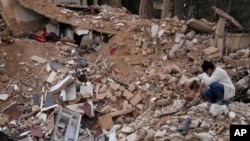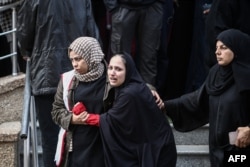Israel and Hezbollah accused each other Thursday of violating a day-old ceasefire agreement intended to bring an end to more than one year of fighting.
The Israeli military said its air force struck a facility Thursday used by the U.S.-designated terrorist group Hezbollah to store midrange rockets in southern Lebanon.
Israel also said it opened fire Thursday toward what it characterized as “suspects” with vehicles arriving at several areas in the southern zone, calling it a violation of the truce.
Hezbollah lawmaker Hassan Fadlallah, meanwhile, accused Israel of breaching the ceasefire.
“The Israeli enemy is attacking those returning to the border villages,” Fadlallah told reporters. “There are violations today by Israel, even in this form.”
The Lebanese army also accused Israel of violating the deal. “The Israeli enemy violated the deal several times,” the army said, citing airstrikes and attacks on Lebanese territory with “various weapons.”
The ceasefire took effect early Wednesday. Accusations from both sides underscore the deal’s fragility.
Under the terms of the deal, unauthorized military facilities south of the Litani River must be dismantled, but the agreement does not mention military facilities to the river’s north.
The ceasefire stipulates that Israel can take up to 60 days to withdraw from southern Lebanon but that neither side can launch offensive operations.
The truce, which was brokered by the United States and France, is supposed to last 60 days in the hope of reaching a permanent cessation of hostilities between Israel and Iran-backed Hezbollah.
Is a Gaza truce next?
In announcing the ceasefire agreement Tuesday, U.S. President Joe Biden said he would now renew his push for a ceasefire agreement between Israel and Hamas.
Despite Biden’s calls, there is no sign that Israel is interested in a quick ceasefire in Gaza.
“Gaza will never be a threat to the state of Israel again,” Israeli Agriculture Minister Avi Dichter told reporters this week. “We will reach a decisive victory there. Lebanon is different.
“Are we at the beginning of the end [of the Gaza campaign]? Definitely not. We still have a lot to do,” said Dichter, who is a member of the inner security Cabinet and a former head of the Shin Bet intelligence agency.
War broke out between Israel and Hamas after the U.S.-designated terrorist group killed some 1,200 people and captured more than 250 hostages in Israel on October 7, 2023.
Israel’s response has killed upwards of 44,200 people and displaced nearly all the enclave's population at least once, Gaza officials say, with huge parts of the territory destroyed.
Months of efforts to negotiate a ceasefire agreement between Israel and Hamas have produced little progress, each side blaming the other for the stagnation.
Hamas official Sami Abu Zuhri on Wednesday accused Israel of being inflexible, saying his group wanted a deal.
“We hope that this agreement [with Hezbollah] will pave the way to reaching an agreement that ends the war of genocide against our people in Gaza,” he told Reuters.
Mediator nation Qatar suspended its efforts to reach an agreement until both sides are ready to make concessions.
On Thursday, Israeli Prime Minister Benjamin Netanyahu said that conditions for obtaining a possible deal to secure the release of Israeli hostages in Gaza have improved.
“I think the conditions have very much changed for the better,” Netanyahu told local Channel 14 when asked about a possible hostage deal. He did not provide details.
Israel strikes Gaza targets
Israeli military strikes killed at least 26 Palestinians across the besieged Gaza Strip Thursday, according to medical officials.
The deaths came as forces increased their bombardment of central parts of Gaza and tanks pushed deeper into the enclave’s north and south.
Six people were killed in separate airstrikes on a house and near the hospital of Kamal Adwan in Beit Lahiya in the north of Gaza. Four others were killed when an Israeli strike hit a motorcycle in Khan Younis in Gaza’s south.
Later Thursday, an Israeli airstrike near a tent encampment housing displaced families in Khan Younis killed at least five people and injured others, according to medics.
In the refugee camp Nuseirat, Israeli planes carried out multiple airstrikes that killed at least 11 people, according to health officials at a hospital in the camp. The attacks destroyed a multistory building and hit roads outside mosques.
Dozens of families were trapped in their homes after tanks advanced from the northern area of the camp, and some ambulances were unable to reach them because of tank fire, the health officials said in a statement.
The Israeli military told Reuters that its forces were continuing to “strike terror targets as part of the operational activity in the Gaza Strip.”
Israeli tanks also pushed deeper into the northwest area of Rafah, near the border with Egypt, according to residents.
Israel has not commented on the latest fighting.
The Lebanon truce has made the sense of suffering feel all the more severe for some inside Gaza.
“I hope a ceasefire will happen like it did in Lebanon. ... I just want to take my children to see my land, my house, to see what they did to us. I want to live in safety,” Amal Abu Hmeid, a displaced woman in Gaza, told Reuters.
"God willing, we will have a truce." she said.
Some information in this report came from Reuters and Agence France-Presse.














